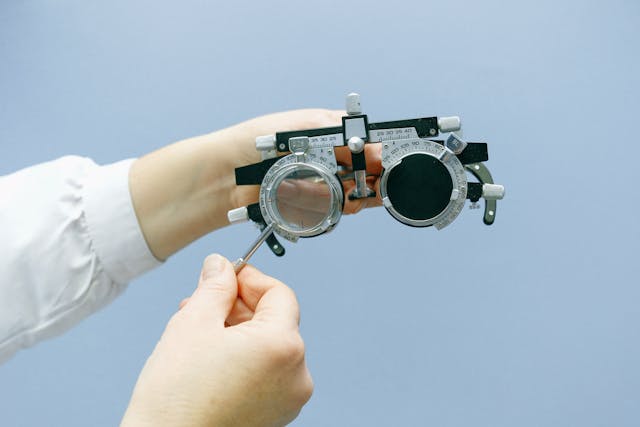The best way to minimize the risk of permanent eye injury and vision loss is to see an ophthalmologist for early detection or preventive eye care. Many decisions about protecting your vision or treating an eye disease will be guided by your ophthalmologist. How can you locate the best ophthalmologist for your needs? It’s just as critical to pick an eye doctor as it is to pick a general practitioner. Your eyes are a window not only to the outside world but also to your overall well-being. Since your eyes are such an important part of your daily life, choosing a good eye doctor specialist is not a decision to be made lightly. Here are some main considerations to bear in mind.
1. Know Which Type of Doctor to Consult
Optometrists and ophthalmologists are the two types of eye doctors in general. Optometrists can diagnose and treat certain eye diseases, as well as prescribe medications, but they do not perform eye surgery. To become an optometrist, one must first complete college, then four years of optometry training, where they can specialize in some forms of eye disease. Ophthalmology doctor Coimbatore diagnoses and treats a wide range of eye diseases, as well as administers medications and performs eye surgery. To become an ophthalmologist, one must first complete college, then four years of medical school, followed by four years of residency. After completing their residency, some ophthalmologists may choose to specialize in a specific form of ophthalmology for up to several years, though this is not mandatory to be considered a general ophthalmologist.

2. Get Referrals
Start with a list of referrals from your optometrist, or primary care physician, or Best eye hospital Coimbatore. You may also seek advice from relatives, colleagues, and other healthcare professionals. Use hospital websites to check out the doctors’ qualifications and experience. Keep in mind that there are several different types of ophthalmology subspecialties, such as those who treat glaucoma or disorders of the cornea or retina. Call each ophthalmologist’s office and request a consult appointment to meet and interview the doctor while you narrow down your list.
3. Research the Ophthalmologist’s Credentials
When selecting an ophthalmologist, board certification is one of the most significant criteria to consider. It indicates that the doctor has the requisite education, training, and experience to provide the best possible ophthalmic treatment. Fellowship training in a subspecialty is particularly beneficial. Confirm that the ophthalmologist has never been sued for malpractice or faced any disciplinary action. On hospital websites, you will learn about the ophthalmologist’s medical school, training hospital, certifications, and malpractice and disciplinary background.
4. Ask About Telehealth Capabilities
With the ongoing pandemic, telehealth consultations are a good idea. Telehealth refers to the use of telecommunications technologies, such as two-way recording, tablets, and email, to diagnose and manage certain patients. Inquire about the doctor’s telehealth services. Telehealth does not substitute face-to-face appointments with doctors, but it does save time and money for many patients. Some conditions can be treated by submitting symptoms and vital signs collected at home to the physician and making a “virtual appointment.” Telehealth is a convenient choice since it can be used for regular follow-ups and minor problems. Check to see if telehealth facilities are covered by your health insurance.
5. Consider the Ophthalmologist’s Experience
When it comes to eye disorders or conditions that could impair your vision, experience counts. The more experience a Best Ophthalmologist has with a particular disease or treatment, the better the outcome is likely to be. Inquire about the ophthalmologist’s experience treating patients for your particular disease. If you need a new procedure, find out how many the doctor has done and what the complication rates are—both the complications the doctor has seen and your own chance of complications.
6. Read Patient Reviews
Reading what other people have to say about a doctor will give you an idea of how he or she practices medicine and runs his or her medical practice. Patients’ experiences with scheduling appointments, wait times, the office climate, and the friendliness of the office staff are usually reflected in patient reviews. You will find out how much patients trust the doctor, how much time he or she spends with them, and how well they react to questions.
7. Know What Your Insurance Covers
It’s a practical matter to have insurance coverage. You will need to pick an ophthalmologist who participates in your plan to get the most insurance coverage and pay the least out-of-pocket for your treatment. When choosing an ophthalmologist from your schedule, you should also weigh qualifications, expertise, results, and hospital quality.
8. Availability
Is service available whenever you need it, including on Saturdays and after 5 p.m.?
If you need your glasses changed or fixed during your lunch break? Do you need glasses after work or from your child’s practice that just ended at 5:00 p.m.? Awoke with an eye problem on Saturday? In those cases, you’ll need your doctor and their team. For the best coverage, look for offices with more than one doctor. Six days a week, appointments should be open. The optical should also be open on Saturdays and after 5:00 p.m. Also, the office should be open during your lunch hour – nothing is more frustrating than heading out on a fast lunchtime errand just to find the office locked. If you need urgent assistance, it is critical to determine whether you can be seen quickly. Most good practices will triage your problems and, if you need help right away, will fit you into their schedule. Most high-quality medical doctors and ophthalmologists are booked 2 to 3 weeks in advance, but depending on the symptoms, they will make every effort to see you as soon as possible.
Eye care specialists are trained professionals who diagnose and treat a wide range of vision-related conditions, ensuring optimal eye health and clear vision for their patients.






1 Comment